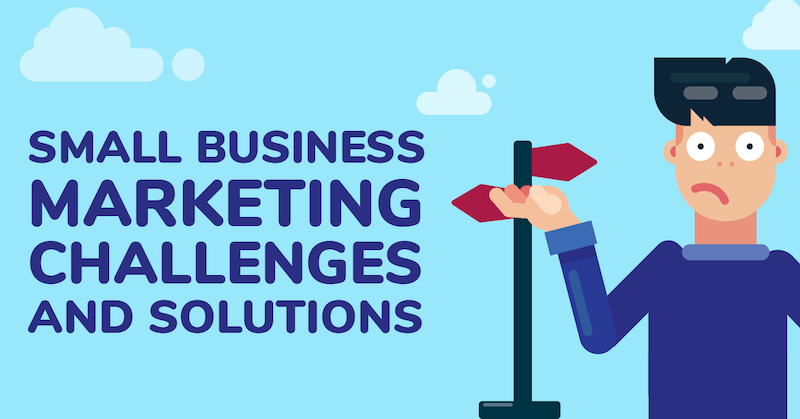Small Business Marketing Challenges and Solutions

It’s no secret that small businesses face a lot of challenges. Oftentimes, small business owners wear a lot of hats or have departments comprised of small but mighty crews. When it comes to small business marketing, it can seem impossible to keep up because there are so many marketing options and fierce competition. The good news is many of these challenges are solved with a little guidance and focus.
We’ve put together a list of common small business marketing challenges and solutions that can help conquer those marketing woes.

Small business marketing challenge: lack of clear marketing goals and objectives
We talk about goal setting often, and for good reason. As small business owners must face different challenges and juggle many responsibilities, strategy is sometimes an afterthought. A lack of clear marketing goals and objectives is a problem that can turn into a monster if it’s not addressed early on.
It’s easy to get stuck in the weeds. Maybe you want to create five unique Facebook business posts a week. Maybe you want to shoot a video series for your new YouTube channel. Maybe you want a website refresh because your top competitor’s site has an image carousel and it looks cool. It’s great to have ideas, but it’s important to take a step back and ask yourself – what’s the reasoning behind these ventures? Are they creating value for your brand or are they passion projects? If you can’t answer these questions, it’s time to develop a marketing strategy.
Without goals or a strategy in place, you have no way to filter out the marketing projects that are time wasters. Marketing strategy doesn’t need to be complicated to be effective. To get started, think about these three things: who, what, and how.
Who is your audience? What are the best ways to reach them? How are they finding you and moving through the marketing funnel? If you need a refresher on the marketing funnel, check out our series here.
Take time to research these questions to get accurate answers. Guessing won’t help – do the legwork so you have a solid foundation to base your marketing strategy on. Once goals and objectives are in place, you can move forward.
- Read more about setting SMART goals.
- Take our full-funnel marketing crash course Part 1 & Part 2.

Small business marketing challenge: marketing FOMO
There are more ways to advertise your business than ever: social media, websites, email, SEO, videos, along with other digital and traditional methods. The problem is, which marketing tactics should you focus on? If you’re not doing them all, are you falling behind your competitors? Not necessarily.
Instead of focusing on marketing FOMO, invest in what is already working. Jumping from one approach to another wastes two of your most important resources – time and energy. By doing this, you can stretch yourself too thin. In most cases, if you’re bouncing around, you’re not spending enough time on each tactic to move the needle.
With this in mind, it’s important to outsource tasks when needed; one person or a small team can’t do it all. If you’re happy with your in-house social media but aren’t familiar with building websites, find a trusted partner who can create a well-designed, responsive site for you. Delegating critical and technical tasks to professionals will free up resources and help out your small business marketing in the long run.
Read about 8 questions to ask your next media agency.

Small business marketing challenge: algorithm changes
Algorithms are often portrayed as the enemy in the marketing world. Once an algorithm changes, marketers wonder: “How is this going to negatively impact me?” But algorithms aren’t as mysterious or hurtful as you might think.
When talking about algorithms, we’re usually referring to search engines (like Google or Bing) or social media sites. Instead of fighting algorithm changes, evolve your strategy to follow best practices. Consider the ideas below:
Social Media
Content delivery on social media continues to change. Businesses that once relied on organic reach saw it plummet as past algorithm changes crushed this tactic. For small business owners, this can be crushing. Nowadays, relevancy is based on a mix of several factors. Facebook says that user feeds prioritize meaningful conversations over transactions. Instagram no longer shows images in chronological order, but instead factors your feed based on activity, interactions, and information about the post.
- Learn to pivot and understand what content these platforms value. Posts and videos users interact and engage with are prioritized. Consistently posting high-quality images and videos will keep fans engaged with your brand. If you need some social strategy guidance, check out our article on 4 common social media marketing mistakes.
- Add paid media to the mix. Competition for organic reach is fierce, so consider adding paid advertising to rise above the noise. Finding a balance of paid and organic content can set you up for success, even when algorithms change in the future.
- Read how SEO and Paid Search work together.
Search Engines
Everyone wants to be on the first page of Google. You can pay for space at the top of search results using SEM marketing, but we’re going to focus on organic ranking. Google is reported to change its search algorithm around 500 to 600 times each year. Although most of the updates are small and don’t often impact SEO, Google will occasionally release major updates.
- Keep your site on Google’s good side. There are several ways to keep your site in tip-top shape. One way is to regularly check your web traffic in your analytics platform and search rankings for your target keywords. Google heavily factors user experience on sites and considers load time, interactivity, and content, among other factors in their search rankings. If you see a major dip in traffic, run diagnostics on your site. Google Search Console is a free tool that helps you measure search traffic and performance.
- Create high-quality content. Google rewards sites that provide high-quality content. If you are doing SEO right — like creating good, user-focused content and earning links from trustworthy sites — you shouldn’t be penalized when new changes roll out.

Small business marketing challenge: unrealistic expectations
You can dream about going viral or using “free” marketing tools (like social media) to get a ton of customers, but unfortunately, the chance of this becoming a sustainable strategy is slim to none. Spending $0 on marketing with the expectation that it will attract and nurture new customers just isn’t realistic.
We know that many small businesses have a limited marketing budget. And that’s okay! Just remember to keep your expectations in line. The key is using your limited budget on the right tactics to sustain growth. If you’re working with a marketing agency, they should keep an eye on performance and allocate budget where it makes sense. If you’re seeing positive results with one tactic but another isn’t moving the needle, think about moving more money to the tactic that’s working.
Finding a balance of short-term paid tactics (such as SEM) and cost-effective long-term strategies (such as organic SEO) will keep your marketing funnel full.
Don’t let small business marketing challenges overwhelm you
If you’re struggling with small business marketing challenges or feel overwhelmed by all the options available, know that you aren’t alone. There are many successful marketing strategies for small businesses built around tight budgets and creative solutions. The key is to have marketing goals in place and strategy built around those goals. Tackle each challenge one at a time and use our ideas to overcome these hurdles. As always, MPP is here to help with your small business marketing challenges.


